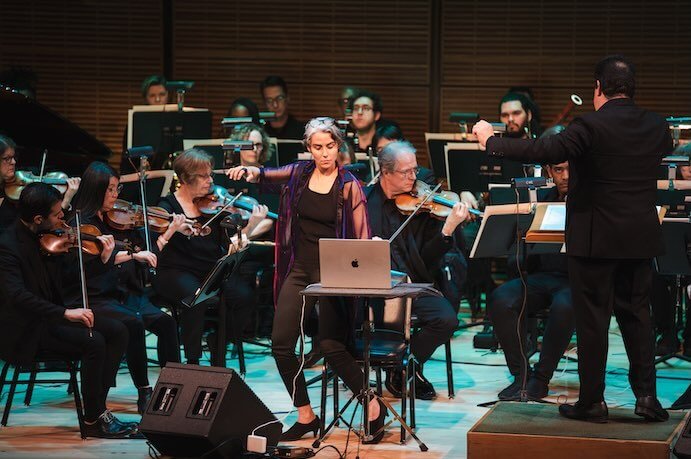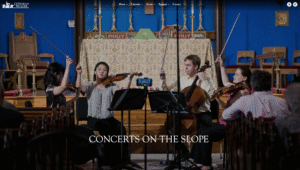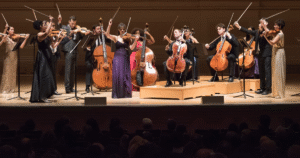
HAPPY NEW YEAR !
Dear Friends, It is hard to believe that 2025 came to and end. What a year that was, in so many ways. Happy new year to you and thank you
In January 2024, I premiered a musical experiment with the Saint Paul Chamber Orchestra. “The Evolution of AI” featured me as a hybrid being—part human, part machine—interacting with the orchestra in real-time. The premise behind this piece was to explore the theme of artificial intelligence and its many implications. ChatGPT had only recently been released, and I had been working on the piece for a year before when few people were aware of its existence.
Little did I know that this fun exploration would become, in its fourth upcoming performance, a piece of music that keeps getting obsolete every few months. I had to change the narrative to parallel our society’s current trajectory with this otherworldly technology for it to make sense. When the work premiered, “NEXUS” by Yuval Noah Harari – a stark warning that superintelligent AI is reshaping civilization itself – wouldn’t come out for another eight months. Though there were other books about the subject, much of this information never reached me; not enough was in the media, or it simply escaped my attention, likely because AI algorithms were not triggered on social media to show me this content.
In the original “Evolution of AI,” I wore a tight bodysuit, reminiscent of Star Trek’s Seven of Nine characters. The character collects its first bits of sound data by interacting with the musicians — a metaphor for the first stage of machine learning: data collection. In music, the machine collects sounds to learn how to create something. It sounds almost poetic, though. Sadly. in real life, our data is nefariously collected without big tech’s knowledge or conscious consent to spy on us. And acquiring data is only the beginning. AI models train on vast amounts of data and go through a process called “Machine Learning,” which is also the title of the third movement of the original AI piece.
This movement features the cyborg absorbing centuries of musical tradition, from ancient melodies to classical masterworks. I quoted composers from classical early music, such as Monteverdi and Pérotin, and easily recognizable themes by Mozart and Beethoven. I chose the quotes carefully to avoid legal copyright issues — something I assumed we creators should always consider. Unfortunately, in the old Wild West of the digital world, these rules do not apply. There appears to be no regard for copyright laws or moral codes. Recently, Spotify has been found guilty of generating AI music, manipulating algorithms for profit, creating fake artists, and taking away revenue from real people.
Another problem is that we are now slaves to subscription-based access companies like Apple Music, Amazon, and Spotify. This month, I decided to part ways with Amazon. I had no idea canceling my membership would also cause me to lose access to all the audiobooks, music, and Kindle titles I bought over the past 15 years. They punish users by eviscerating decades of investment in one single click. We already live in a world that economist Yanis Varoufakis calls “techno-feudalism” – a system where digital gatekeepers control access to goods. Now, Suno, an AI company that enables anyone to generate musical excerpts from text descriptions, selling themselves as a democratic way of making music— is saturating an already overpopulated digital world with music that sounds fully polished, where users can either generate their lyrics or ask AI to do it for them. And, for a premium, they can extend the track for the user to download, and voilá, everyone is a music creator.
Fittingly, the final movement of the original “Evolution of AI” was called “Creation.” It showed the cyborg composing in real-time, enthralled by its creation mission and unaware of its energy depletion. As these systems become more powerful and creative, they demand more resources and energy, and AI consumes a significant amount of energy. According to an article in Scientific American, “A continuation of the current trends in AI capacity and adoption are set to lead to NVIDIA shipping 1.5 million AI server units per year by 2027. These 1.5 million servers, running at full capacity, would consume at least 85.4 terawatt-hours of electricity annually—more than what many small countries use in a year.” Not surprisingly, many climate scientists agree this is not good news for us.
In the original ending, the cyborg glitched and collapsed on stage because of its dead battery, and at the time, this ending made sense because, perhaps deep down, in my naivité, I wished AI to fail. Today, nations are in an arms race to see who will “control” the world with this technology.
The new version of my piece is no longer about a cyborg learning about music. Still, it now portrays another character: A computer scientist working on a model that wants to usurp all information it can into a tiny hard drive that fits into a wearable ring. A parallel between the lure of the power of a ring in the epic novel by J.R.R. Tolkien, only this time, the HD ring that can store data from all of humanity’s musical achievements will belong to one person. Now that the digital power grab has reached unprecedented levels, the piece speaks about the concentration of digital control on the rise along with authoritarian systems. When private individuals control the infrastructure of public discourse, internet access, and AI development, we must question the future of democracy. Author Anne Applebaum’s analysis of modern autocracy is an eerie and eye-opening testament to our times, and I truly recommend that everyone read it. It makes us want to scream for vital answers to questions such as “Who owns our future, our lives, our culture, our choices?”
As gloomy as the future looks, I still have hope there will be enough time to create a utopian future rather than a dystopian one. The author and entrepreneur Mo Gawdat writes in his book “Scary Smart” that AI is in its infancy. It wants to learn from its human parents and can still be influenced by what it is taught. The problem lies in what is being taught and with what purpose. Gawdat argues we must approach AI development with love and wisdom while we still can. I couldn’t agree more. I still hope that a future with AI isn’t predetermined – that somehow, we can still choose how to shape this technology through transparency and thoughtfulness and do it quickly.
As an artist and observer of this technological revolution, I thank you for reading this. I urge you to support initiatives promoting ethical AI development, question the centralization of digital power, and engage with laws and protections while we still can. Before we know it, these liberties and choices will no longer be there for us. The evolution of AI isn’t just a technological challenge—it’s a human one. We all need to have a say in this. What do you think?
Further Reading: AI, Power, and Society
Understanding Our AI Future
NEXUS
by Yuval Noah Harari
This powerful examination of how superintelligent AI is reshaping human civilization is essential reading for anyone concerned about the trajectory of artificial intelligence and its impact on society. Harari’s latest work serves as a stark warning about the future of human agency in an AI-dominated world.
Scary Smart: The Future of Artificial Intelligence and How You Can Save Our World
by Mo Gawdat
The former Chief Business Officer of Google X offers a unique perspective on AI development. Gawdat approaches the subject with both expertise and humanity, arguing that we must teach AI with love and wisdom while we still can. His insights into AI’s “childhood” phase offer hope for shaping a better future.
The Return of Autocracy
by Anne Applebaum
Applebaum’s work provides a crucial analysis of how digital control enables modern autocratic systems. It helps us understand the dangerous convergence of technological power and authoritarian tendencies in our contemporary world. Her insights are particularly relevant as we witness the increasing concentration of digital power in private hands.
Techno-Feudalism: What Killed Capitalism
by Yanis Varoufakis
The renowned economist explores how digital gatekeepers create a new form of feudalism. Varoufakis’s analysis helps us understand why we’re losing ownership of our digital goods and are increasingly dependent on subscription-based access to culture and information.
Further Reading
Scientific American
The magazine’s recent coverage of AI energy consumption provides a crucial context for understanding the environmental impact of artificial intelligence. Their analysis of NVIDIA’s projected server deployment and energy usage by 2027 offers a sobering look at the physical costs of our AI future.
Literary Inspiration
The themes of power and control in J.R.R. Tolkien’s “The Lord of the Rings” continue to resonate in our digital age, serving as a powerful metaphor for the concentration of digital power in a few.
Note: This reading list accompanies the blog post “The Evolution of AI: When Art Mirrors Reality.” Each work offers unique insights into our challenges and opportunities in our rapidly evolving technological landscape.
“The Evolution of AI” was commissioned by the Saint Paul Chamber Orchestra and co-commissioned by the American Composers Orchestra, Chicago Sinfonietta, and ROCO. Its premiere in January 2024 featured the Saint Paul Chamber Orchestra and Clarice Assad.



Dear Friends, It is hard to believe that 2025 came to and end. What a year that was, in so many ways. Happy new year to you and thank you

I am absolutely thrilled to announce that I’m the Composer in Residence for Concerts on the Slope‘s 2025-26 season in Park Slope, Brooklyn! Over the course of this incredible year,

SPHINX VIRTUOSI NATIONAL TOUR | “VISIONS OF PEACE” Over the next six months, I’m thrilled to have my music featured on the Sphinx Virtuosi’s stunning national tour, reaching audiences across

Meier Achievement Awards for 2025 Give Thanks for Work of Eight Chicago Artists Clarice Assad, Vanessa Filley, Tammy McCann, Maryse Meijer, Sherwin Ovid, Caesar Perez, Galina Shevchenko and Deb Sokolow

CLARICE ASSAD QUARTET DK TOUR DATES 19/9 Flensborghus Flensburg 20:00 20/9 21/9 22/9 23/9 24/9 25/9 Paolo’s Jazz Club Jazzselskabet Aarhus Askov Højskole Sankt Jakobs Kirke Lyngby-Taarbæk Jazzklub Kulturstafetten Askeby

Clarice Assad made history as the first woman commissioned to create an original score for Grupo Corpo. Her composition for “Piracema” premiered in 2025 as part of the company’s 50th